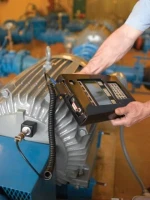Motor Protection
Motor Protection Relay Advancements Explained
Improving Energy Efficiency Through Motor Protection
Motor Protection
Evolution of Motor Protection with VFDs
The integration of Variable Frequency Drives (VFDs) in motor control has revolutionized the way motors are operated and protected. VFDs offer enhanced control over motor speed and torque, leading to improved efficiency and performance. However, they also introduce unique challenges in motor protection, necessitating an evolution in Motor Protection Relay (MPR) technologies.
Variable frequency drives (VFDs) have revolutionized motor control in industrial applications. They offer significant advantages like adjustable motor speed, improved efficiency, and soft starting capabilities. However, VFDs introduce unique challenges for motor protection relays (MPRs) due to the altered nature of the power delivered to the motor. This article explores how MPR technology is evolving to address these challenges and ensure effective protection for motors operating with VFDs.
Visit Our Electrical Protection Study Course
The Challenge of VFDs: A Different Power Landscape
Traditional line-fed motors receive pure sinusoidal AC power at a fixed frequency. VFDs, on the other hand, convert DC power to a variable frequency, pulse-width modulated (PWM) AC waveform. This altered waveform presents several challenges for motor protection:
- Electrical Harmonics: The PWM waveform generated by VFDs contains a rich spectrum of harmonic frequencies superimposed on the fundamental frequency. These harmonics can cause overheating in motors,...
Related Articles
Improving Energy Efficiency Through Motor Protection
Motor Protection Relays (MPRs) are crucial in safeguarding motors against various operational threats that can lead to inefficiency and increased energy consumption. By ensuring optimal motor performance and protecting against potential issues, MPRs play a vital role in enhancing energy efficiency...
Predictive Maintenance Trends Using Motor Protection Relays
Predictive maintenance represents a significant shift in how motor protection relays (MPRs) are utilized in industrial settings. By leveraging advanced analytics and machine learning algorithms, MPRs are now instrumental in preempting motor wear and failure, marking a proactive approach to...
Motor Thermal Overload Protection
Motor Protection Relays (MPRs) are crucial in safeguarding motors from thermal overload, which can cause significant damage if not properly managed. These relays protect motors by monitoring the motor current and calculating the thermal load, but achieving accurate thermal overload protection...

Bearing Protection of Inverter-duty Motors
Although it is now common knowledge that inverters—also known as variable frequency drives—often induce unwanted motor shaft voltages, many customers who purchase three-phase alternating current (AC) induction motors do not realize that models labeled “inverter-duty” or “inverter-ready”...

Compatibility Issues with Generator-Backed Power Systems
Line-interactive uninterruptible power supply (UPS) systems play a vital role in maintaining seamless operation during power outages. Their integration with backup generators, however, can pose challenges regarding synchronization and power quality. While both UPS systems and generators serve as...
Improving Energy Efficiency Through Motor Protection
Motor Protection Relays (MPRs) are crucial in safeguarding motors against various operational threats that can lead to inefficiency and increased energy consumption. By ensuring optimal motor performance and protecting against potential issues, MPRs play a vital role in enhancing energy efficiency...
Motor Protection in Critical Industrial Processes
Motors are the workhorses of industry, driving essential processes and machinery in sectors ranging from manufacturing to utilities. Motor Protection Relays (MPRs) serve as guardians for these critical components, ensuring their safe and efficient operation. This article delves into the...
Evolution of Motor Protection with VFDs
The integration of Variable Frequency Drives (VFDs) in motor control has revolutionized the way motors are operated and protected. VFDs offer enhanced control over motor speed and torque, leading to improved efficiency and performance. However, they also introduce unique challenges in motor...
Predictive Maintenance Trends Using Motor Protection Relays
Predictive maintenance represents a significant shift in how motor protection relays (MPRs) are utilized in industrial settings. By leveraging advanced analytics and machine learning algorithms, MPRs are now instrumental in preempting motor wear and failure, marking a proactive approach to...
Motor Protection Relay Advancements Explained
Motor Protection Relays (MPRs) are evolving rapidly, integrating cutting-edge technologies to offer superior protection for motors in various industrial applications. These advancements not only enhance the reliability and efficiency of motor operation but also bring sophisticated diagnostic and...
